Olusoji Adetokunbo Fasuba is the fastest pair of legs the African continent has ever known. Between 2004 and 2008, he won every available title in the 100m in Africa. He is the only sprinter in Africa to have won the 100m gold at the African championships three times consecutively.
In this interview by sports enthusiasts on Family United By Sports (FUBS), a WhatsApp platform dedicated to addressing issues in sports in Nigeria, the 36 year old (will actually be 36 in July) says his historic 60m World Indoor Championships title-winning feat represents his best moment in track and field.
Fasuba also reveals how he was robbed of a 60m indoor medal in 2006, the year he ran a 9.85 seconds to set a new African record…
Who is Olusoji Fasuba? Where is he from?
I am from Ado Ekiti in Ekiti State, but I grew up in Sapele, Delta State.
Ekiti to Sapele! What carried you to Delta?
My dad travelled a lot and as an instructor in the ministry of defence, he ended up working in the Nigerian Navy based in Sapele.
I have just been corrected that you are not one time Africa’s fastest man but the reigning Africa’s fastest man! How does this make you feel?
Lol, when I achieved that feet in 2006, I was so elated I didn’t know if I should cry or jump for joy. Now I still feel happy that I was able to achieve that.
The record still stands. Are you surprised? Please run us through how it happened. I mean how you prepared for it. Was it a feat you envisaged or it just happened?
I am still surprised that the record still stands because we have the south African running a lot of 100m under 10sec and he has come close on two occasions to breaking it.
2006 is a year that I will never forget. It didn’t start too good for me because I had hopes of winning the world indoors that year in Moscow, Russia, but finished in the sixth position due to some technicalities.
Without working on my top end speed, I went to Melbourne for the Commonwealth games and surprised myself with a silver in the 100m.
I flew back to Nigeria happy but determined to work harder and three weeks before the African record, I did personal best in the 80meters, 120m and 150m time trials my coach set for me.
Two days later, I fell sick and was so unhappy because I knew that I was ready to do something great. My coach had to reduce my training and gave me more tempo runs.
On the day of the competition, I remember getting to the track and after I started my warm up, I broke down crying, telling my coach that I felt ready to do something great but my body didn’t feel like mine at all. He didn’t panic and started giving me some different kind of stretches. I normally run 60m twice before I go into the call room and after he timed my first 60m, he thought his stop-watch was faulty when he saw the time and the rest as they say is now history.
Running 9.85 seconds was undoubtedly one of your best moments in track and field. Which is your best, the record-setting feat in 2006 or the 60m World Indoor title feat which made you the first and so only African to win the event?
For me, the my best moment will be wining the first ever 60m gold at the world championship as I would always be remembered as the first man to achieve that feat although I am still the only man to have done it for Africa.
When you ran 6.49 seconds in 2007, did that give you the confidence to go for the World title in 2008?
I was ready to win that title in 2006 but due to some known technicalities, I knew I was robbed. So, in 2008, my coach changed my training plan and ensured that no matter what, I would be getting it that year.
Also Read – Rufai: How I Transformed From Midfielder To Goalkeeper; My ‘Surprise’ France ’98 W/Cup Call-up
You are on record as the first Nigerian nay African man to win three consecutive 100m gold in the history of the African Championship. Since that final win in 2008 in Addis Ababa, Nigeria has not won the event, what do you think is responsible for this?
Before I retired/gave up, I kept on lamenting on the fact that Nigeria was not focusing on the younger ones coming up and were only ready to focus on the athletes when they start winning which to me spelled doom.
The male sprinters were not coming to either Europe or working on getting a scholarship to make themselves get better, they were comfortable sitting back home then.
Who is this your trainer that you’ve mentioned without his name?
My coach’s name is Perre Jean-Vazel, he was a statistician and he is from France.
Please could you explain “I knew I was robbed”? You were talking about the 2006 event, what event was this?
The 2006 world indoor took place in Moscow. Leonard Scott and I were the favorites tipped to win that competition that year as we both had done 6.51 or so.
So, how were you robbed?
We both qualified and in the finals, we both had a 6.51sec that year. In the finals, I was thrown in the outer lane while the Russian, Andrey Epishin who has never beaten me in the 60m was put close to Leonard Scott.
Before that race, I noticed his block was the only one that had a speaker. Well, the rest is history and he got the silver medal. If I was closer to him, I would have had a fighting chance.
Hats off to all your accomplishments in a country where chances of making it to the top are slim to none during your time and present! Tell us about life after track and field. What do you do to stay healthy (physical, mental and nutrition)?
Thank you very much. My mom being Jamaican played a big role in making sure my diet was good and I was able to cut out red meat from my diet. But I had a very sweet tooth and my weakness was ice cream and cakes.
So, I can say most sprinters weren’t too focused on their diet per se, but I ensured my vitamins were up to date and I also ensured I read through the WADA prohibited list to ensure my supplements were clean.
Your family (children) are they involved in any foundational sports and would you encourage them to do track?
My parents gave me a free hand to choose what I wanted to do and I intend to give my kids that freedom. I will open them to a whole range of other sports for them to try as well as I believe, if you are fast (which I know my firstborn is) then your coordination will be good if managed properly.
Besides being in the British Royal Force, do you have other employment?
I don’t have any other employment as my job as a sailor is tasking at times, although, I do intend to go into the medical line (preferably physiotherapy) when I am done serving.
What role do you see yourself playing in the Athletics Federation of Nigeria (AFN)?
I believe an advisory role is best suited for me and something I will like to do if given the chance as people who are close to me know that I can be blunt when it matters because I know the pain the athletes are going through.
What do you honestly think you can run in 100m now?
If I could finish the 100m race now (why I doubt myself now is because I have gone into baking), I believe I can still do around 10.8 sec. I say 10.8 because when I do pop down the track, most of the kids still can’t beat me in a 40m race and I am wearing my canvas.
My mom is Jamaican and am related to Don Quarrie who was an Olympic medallist in the 80’s. So, I won’t say directly to Bolt, although, when I competed in the circuits, the Jamaicans were friendly to me.
Also Read: Top 10 Fastest Men In Nigeria’s Sprint History!
You achieved Nigeria’s best finish (4th) in the 100m at the World Outdoor championships, would you say you still regret not becoming the first Nigerian man to win individual medals at the world championships indoors and out?
I was happy when I came fourth that year and the reason being my times in the circuit weren’t great that year and there was so much distraction which included the fact that I wasn’t registered for the games and my coach found out late and had to get my manager to register me for the games.
My ticket money I used for the national championship had not been paid and I was promised that it would be paid in Osaka which never happened. We had no kits to run with and there was fear I could be disqualified as I had only my adidas kit with me. We had issues of allowances that kept me up late. So, for me to come fourth with all this stress at the games, I will say it was the blessing of the Lord on me and nothing else.
In 2004, you ran 6.50 indoor which was the third fastest time in the world. How did you prepare for your first indoor season and who was your coach? Also, after the indoor season, you were running 10.4 – 10.6 outdoor and at the trials, you ran fast (10.09), did you change your workout or what?
2004 was a funny year for me. When I got scouted by my first manager, thanks to Chief Tony Osheku, little did I know that my world was going to change.
The day before my first indoor, I panicked as then, I didn’t even know what an indoor track looked like and I remembered sleeping before the race and I fell out of the bed.
My room-mate then told me that as soon as I fell, I sat down and started planning my race and when I was done, I went back to bed. I never remembered doing that but I won’t be surprised if it was true because my wife says before most races, I talk in my sleep how I am going to execute my race.
After the indoor, I started working with my coach, Piere Jean-Vazel if I remember correctly and he was trying out some new plan. I believe I was also speaking with Chief Tony then and he was also giving me some tips.
Thank you for finding this time to field our questions, but I am not happy with you. Why? You quit the stage rather too soon. Why? And no one seems to hear or see you in the mix when it comes to Athletics in Nigeria. Why? This country needs you.
Pardon my bluntness. It’s my pleasure. I believed I had acheived a lot with very little support and when I was an upcoming athlete, I believed that I didn’t need to wait for the country to support me and that if I get to the top, maybe the support would come and I would go as far as I know I can do.
That never happened and when I got injured in 2008, the officials didn’t even bother checking on me except late Sunday Bada. That was when I lost faith.
In 2010, I realised that I had to start making plans for my family and I couldn’t let them (my kids) go through what I went through. So, I decided to position myself where I would give my kids a better future, hence I joined the Navy.
As for the federation, I will like to say that at this time, I am a silent player but I do have a lot of input. There are a lot of people I also like to give credit to, like aunty Amelia who guided me and was also my missing link in my history as she played a vital role in guiding me during my baby years in the senior team.
Would you want to share some of the ill treatments meted out to you that contributed to the decision to quit athletics?
1. My coach could not always get accreditation to games/championships even though I had to pay his ticket to all my events with no support.
2. I was always fighting to get my ticket refund after I paid my way to the national trials.
3.When I got injured, I was asked to send receipt only to be told by my informant that they had released the money but it never got to me even after asking.
I remembered speaking with Dr (Amos) Adamu on funding me for the Beijing Olympics after I won the indoor 60m.The matter died even after making plenty trips at my own expense to Abuja.
Got what it Takes?
Predict and Win Millions Now





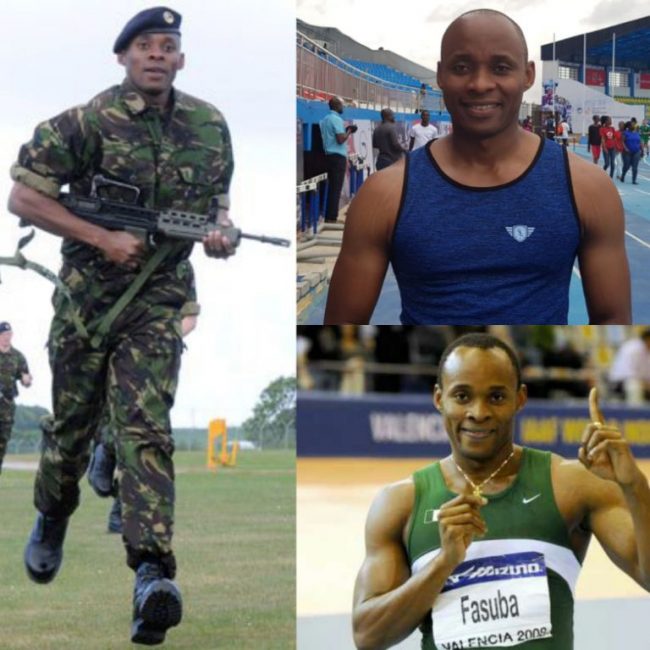
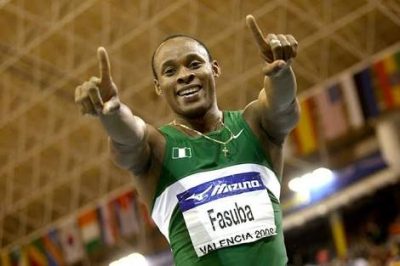
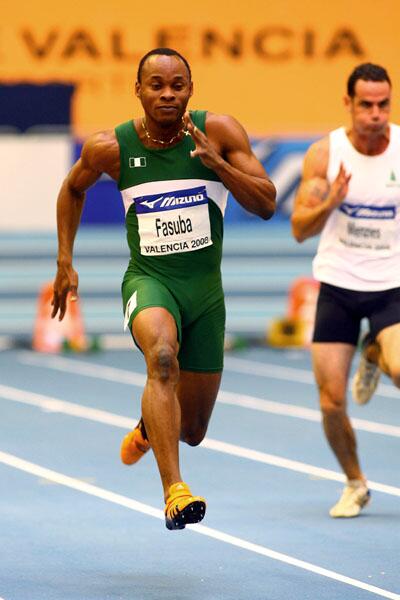
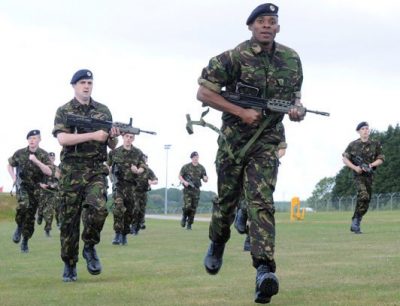

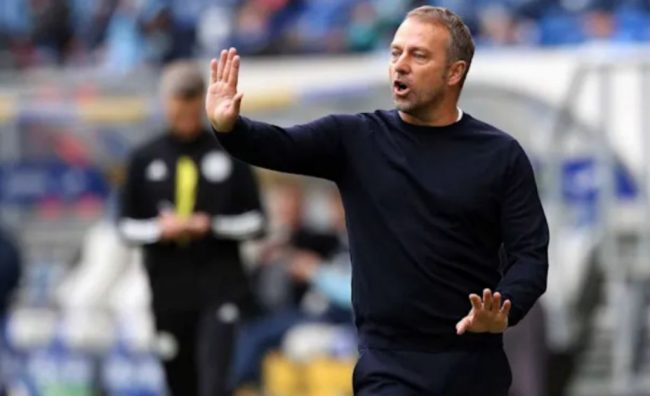

1 Comment
Fasuba mentioned one silent point, that the federation only like to pounce on Athlètes who are about to start winning.. They Never pay attention or spend the resources to groom talents to stardom..
As per this our Federation attitude of never paying Athlètes their entitlements, costs of tickets etc, it is becoming alarming, despite FGN releasing the funds.